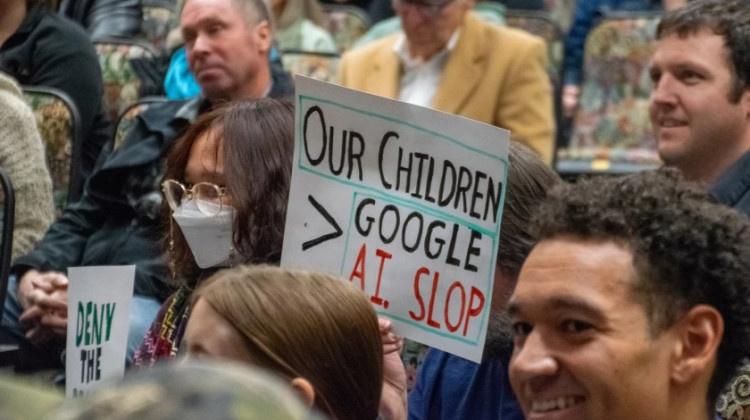Summer in Indiana means a long list of new laws that go into effect on July 1.
The 2018 legislative session was historic on a few fronts, but the most significant new laws went into effect immediately, including legalized alcohol sales on Sundays and the sale of cannabidiol, or CBD oil.
But Hoosiers should be aware of the laws that become official on Sunday:
Murder charge for death of a fetus
A new statute allows prosecutors to charge someone with murder if they attack a woman and cause the death of her fetus.
Existing law allows such charges if the fetus is viable. The legislation eliminates the need for viability.
Previously-closed adoption records now open
This law was actually passed two years ago, but it goes into effect this year. Between 1941 and 1993, all adoption records were sealed. Starting July 1, most of those records will open.

Changes to human trafficking reporting
Health care providers will no longer have to report to law enforcement if they suspect an adult patient is the victim of human trafficking.
Lawmakers say those mandated reports created a problem – trafficking victims stopped going to health care providers.
The law does add a requirement that health care providers provide information that includes the human trafficking helpline and information on where to get help.
And the law doesn't apply to cases with child victims; those must still be reported.
Workforce Development
Holcomb and both parties made workforce development a priority this session. A couple of bills this year aim to address some of the gaps between what businesses need and what workers are skilled in.
One of them expands the eligibility for workforce ready grants, which provide free training in high-demand industries.
Another law is already in effect; it replaces the state's Workforce Innovation Council with the Governor's Workforce Cabinet. The state had to get a waiver for the change in order to maintain federal funding.
Harsher penalties for drug dealers after overdose
A new law imposes harsher penalties on drug dealers if a person overdoses and dies on those drugs.
Some lawmakers question its unintended consequences. Under the bill’s explicit language, if you get pain medicine to treat a toothache and give some to a friend who also has a toothache – and that friend accidentally overdoses and dies – you could face up to 40 years in prison.
Gov. Eric Holcomb says he’s not worried about that because local prosecutors have discretion about whether or not to bring charges.
HEALTH
Eyeball tattoos banned
Eyeball, or scleral tattoos are now illegal in Indiana.
The scleral is the white, protective outer layer of the eye. A tattoo to this body part involves injecting dye into the thin layer. Indiana’s new statue does exempt licensed health professional that may use a similar procedure for cornea damage, but an Indiana University Health optimologist says that's not a current practice.
CBD labeling requirements

Manufacturers must submit their CBD oil to an independent lab for inspection (WFIU/WTIU News)
A new law legalized the sale of cannabidiol, or CBD oil, to all Hoosiers for any reason, effective immediately.
But another provision of the law requires manufacturers to follow a list of testing and labeling requirements, and that part of the law goes into effect on July 1.
Manufacturers must submit their CBD oil to an independent lab for inspection and labels must have QR or bar codes that link to those results and other identifying information.
Baby boxes expanded to some fire houses

A baby box designed to allow people to drop off unwanted infants anonymously (Devin Braegar/WFYI News)
Lawmakers approved legislation this year to expand the state's Safe Haven law to allow 24 hours fire stations to install baby boxes.
The devices are designed to allow someone to drop off an unwanted infant anonymously.
Under the new law, the Hoosier state's third baby box will be installed in a Decatur Township fire station.
Hierarchy for family making health care decisions
A new state law establishes a hierarchy for family members in health care decision-making. It deals with situations where the patient can’t make decisions for themselves – and hasn’t designated a representative.
The new law creates a hierarchy: spouse, adult child, parent, adult sibling, grandparent, and adult grandchild. And if there are no relatives, an adult friend who has "maintained regular contact" with the patient and is familiar with their "activities, health and ... beliefs" can make those health care decisions.
TAXES & FEES
Software now exempted from state sales tax
Under the law, if you go to the store and buy, say, tax preparation software, you’ll be charged sales tax. But if you access that program online, you won’t. Before now, the state wasn’t clear on that difference
Holcomb says Indiana becomes the 31st state to exempt sales tax for what’s known as “software as a service.”
The bill is expected to cost the state between $7 million and $15 million a year. Holcomb says he thinks new investment will more than offset that loss.
Gas tax going up one cent

Gas tax increases are capped at one penny a year – and halted after 2024 without new legislative action (WFIU/WTIU News file photo)
Indiana’s gas tax is set to increase again this year – the one cent hike is small compared to last year’s 10 cent surge.
Lawmakers said the 2017 road funding bill’s 10 cent gas tax hike was to catch up after the state went nearly two decades without an increase.
To avoid falling behind again, lawmakers also created automatic yearly increases, tied roughly to inflation. They’re capped at one penny a year – and halted after 2024 without new legislative action.
EDUCATION
Single high school diploma
A single high school diploma structure will largely align the state with federal graduation rate calculations. The current structure with the new federal rules would mean some schools could see a big drop in graduation rates, prompting action from the government.
Students will still be able to add distinctions to their diplomas for different academic tracks with the new system, like Core 40, academic or technical honors. It also creates an alternate diploma for students with severe cognitive disabilities, and requires the State Board of Education to look into alternative math courses to Algebra 2.
Sex education
Initially, the language would have prohibited schools from teaching sex education without parental consent, including topics like sexual orientation and gender identity.
But that was changed in the House. Schools will have to ask parents for consent and wait to hear back for at least 21 days before sending a second notice. And then 10 days after sending the second note home, if a parent doesn’t respond schools can include that student in sex education courses. The final version does not explicitly include sexual orientation and gender identity, but says the rules apply to material around “human sexuality.”
Dyslexia screening

A new law requires dyslexia screening in all Indiana schools and mandates that each district must have a specialist trained to recognize and teach students with the reading challenge.
Other education laws:
A new law says students can carry and apply their own sunscreen at school. The measure came up after some Indiana schools required a doctor’s note for sunscreen or required students to keep it in a central location like a nurse’s office.
And a group of Lafayette schoolchildren helped deliver – after years of trying – a bill to name the Say’s Firefly the state insect. Indiana had been one of only three states without an official insect – that changes July 1.

Cumberland Elementary students shine lights in their gymnasium to emulate fireflies as Gov. Holcomb arrives to sign the bill (Emilie Syberg/WBAA News).
Reporting requirement for quickly-burning materials
A law aimed at saving firefighters' lives requires home builders to report the use of certain materials to fire departments.
That information would be reported on the building permit for new construction, then passed on the dispatch center. So when a fire is called in, a note in the system will alert the dispatcher to the materials used. Then firefighters will know which part of a building is likely to burn and fail more quickly.
Colored headlights now banned

The law stipulates Indiana drivers can only have white and amber lights on the front of their vehicles. The law also requires taillights to be only red or amber.
The change does not restrict other aftermarket lighting such as neon underglow.
 DONATE
DONATE







 View More Programs
View More Programs


 Support WFYI. We can't do it without you.
Support WFYI. We can't do it without you.